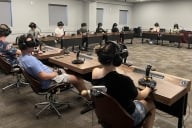You have /5 articles left.
Sign up for a free account or log in.
PHILADELPHIA — One of higher education’s biggest exports is skepticism. So it is perhaps unsurprising that, whereas many educators have questioned the virtue of online education, others would question the way in which the questioners have questioned online education.
A panel of academic technologists ganged up on a straw-man version of the online education skeptic here at the annual Educause conference here on Thursday.
The panel took aim at a number of questions that often come up when online education is put under the microscope, including: Does online education take more time? And does it enable cheating?
Using these questions to prod the worthiness of online education is likely to lead to “causal fallacies” than useful insights, said George Otte, director of academic technology at the City University of New York System. “Just as you can lie with statistics, you can mislead with questions,” he said.
For his part, Otte took aim at the question of online education being a time-suck for professors — a question that has prompted fears of faculty burnout. But the CUNY technologist suggested that this question does not adequately account for the cost, in time, of finding one’s footing on a new teaching platform.
“We may be confounding the time it takes to do something with the time it takes to learn to do something,” Otte said. The first time instructors teach online, they tend to overcompensate for their ignorance by over-investing their time in the virtual classroom. But that does not mean they will not adjust and adapt — just as most instructors did to the circumstance and demands of classroom teaching when they began their careers.
“A linguist once told me that if we were adults when we began language acquisition, and knew how hard it was and all it entailed, who would ever bother?” he continued. “But, of course, that all happens before we think we have a choice and when we’re really good at it.”
In other words, developing fluency in a new medium might be more labor-intensive than sticking to grunts and gestures; but once everybody gets going, it opens up the process of exchanging information to new levels of complexity and understanding.
The new opportunities inherent to online education come with new challenges, particularly when it comes to enforcing integrity rules. Hence the next question: Does online education enable cheating?
Philip D. Long, a professor of innovation in educational technology at the University of Queensland, in Australia, suggested many issues that endanger the integrity of online learning, such as assessing individual contributions to group projects, are not unique to online education.
Issues that are, such as identity authentication and proctoring, stand to become less salient as technology such as Proctor U — a technology that allows universities to monitor test-taking students via Webcam — becomes standard. (And though Long did not mention it, anti-plagiarism software arguably has made essays submitted electronically more reliable than papers submitted in hard copy.)
“The bottom line is, we are not dealing with anything new online in terms of cheating,” Long said. “This is a problem that exists across modes of delivery.”








